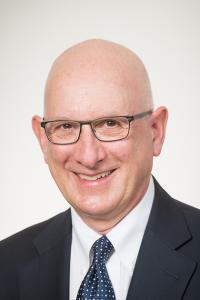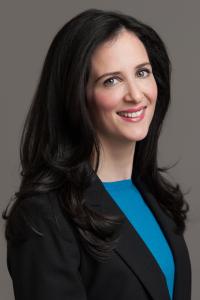Columbia Dental to Expand Special Care Training
For the tens of millions of Americans with special health care needs, maintaining good oral health or receiving dental care can be particularly difficult. These patients may have substantial physical limitations, developmental or intellectual disabilities, cognitive or sensory impairment, or complex medical issues, for example, that hinder their ability to receive oral care. To better serve these individuals, Columbia University College of Dental Medicine (CDM) is gearing up for a new program that will expand education of postdoctoral trainees to provide care for special needs patients of all ages.
A team of faculty and staff led by professor Burton Edelstein, DDS, has received $3.2 million from the U.S. Health Resources and Services Administration (HRSA) to develop and implement new programs focused on special care. The funds are the latest in a series of HRSA grants to support educational and service initiatives at CDM focused on underserved patient populations—a portfolio totaling $14.4 million awarded since 2007. Edelstein and his colleagues are now building on those prior projects, modifying existing programming and integrating it with new components, to develop the special care program, which is formally titled “Building Future Capacity for Special Care Dentistry Across the Lifespan.”
Curating a special care curriculum
Two courses dedicated to special care dentistry, one didactic and the other experiential, are the backbone of the program. Coordinated by social worker Emily Byington and nutritionist June Levine and guided by Marc Michalowicz, DDS, assistant professor of dental medicine at CUIMC and chief of dental medicine at Helen Hayes Rehabilitation Hospital, the hybrid courses will instruct CDM postdoctoral primary care trainees—those in general dentistry (AEGD), pediatrics, and public health specialties—on special care considerations and approaches.
Working closely with the residency program directors, Byington and Levine are identifying relevant materials, which the group will package into a coherent curriculum with the help of an instructional designer. “There’s a vast amount of expertise that exists in bits and pieces around the dental school. We’re consolidating it into something that makes sense and is readily accessible to the residents,” explained Edelstein.
Byington and Levine also are analyzing CDM’s strengths and opportunities in the special care realm. That assessment will inform both didactic and clinical course content, allowing the team to leverage the resources available and address unmet needs at different clinics.
The clinical course, which involves clinical rounds and rotations as well as online education, will emphasize multidisciplinary collaborations in the treatment of special needs patients. That includes the use of electronic health records: “We’re trying to incorporate what kind of information is being collected about this patient population and how the electronic health record could be potentially utilized in the treatment planning and education,” said Levine.
Exploring care from a health systems perspective
To prepare the primary care trainees for an evolving health care climate, an additional course on population oral health management, developed by Edelstein and assistant clinical professor Marcie Rubin, DrPH, will supplement the special care curriculum. A self-paced, online course will cover fundamentals of new health care models and systems reform, with connections to special needs populations integrated throughout.
In a population-based model of care, provider groups are reimbursed, at least in part, according to the health outcomes of a defined patient population rather than only for provision of dental services. “You’re paid based on how well the patients do as opposed to how many teeth you cleaned or repaired or extracted. It’s looking at health, rather than the lack of it,” said Byington. According to Edelstein, this shift is “a dramatic change already underway in medicine” that could benefit disadvantaged populations by rewarding health improvements among those with the greatest needs.
Engaging trainees across New York City and beyond
For 12 years running, Edelstein and his team have organized an annual meeting—the Regional Primary Care Dentistry Training Convocation—centered on underserved and vulnerable populations. The event gathers primary care dentistry trainees and program directors from around the tristate area for an evening of learning and networking. The new HRSA grant will sustain the convocation for another five years, and each year the convocation will spotlight a type of disability: developmental and intellectual, sensory, physical, mental and cognitive, or behavioral and emotional.
Spearheaded by assistant professor Hosam Alraqiq, BDS, EdD, the next convocation is slated to take place online in spring 2021. He and his colleagues are enthusiastic about the opportunities afforded by a virtual platform, namely the ease of meeting and interacting with other attendees and the potential to expand participation to primary care programs in other regions.
Among the activities planned for the 2021 convocation is a screening of short day-in-the-life documentaries featuring people with special health care needs, such as a deaf New York City actress. Alraqiq, who is working with the producer to create the videos, said they are intended to give participants a window into the experience of individuals with disabilities and anchor breakout room discussions.
The annual convocation is not the only component to engage providers from other institutions: The grant also supports the ongoing Public Health Scholars Program. Every year this initiative provides three pediatric or general dentists in New York City with a stipend to pursue an advanced degree in public health or health care administration. As part of the initiative, scholars conduct and present research, which for this year’s and upcoming cohorts will focus on topics linked to special care. Edelstein’s team takes an active role in the program by facilitating conversations to connect past and present scholars, discuss their progress, and collaborate on projects.
Keeping an eye on improvement
Finally, reporting and assessment have a key role in the special care program. Data collection has already begun via surveys of the primary care postdocs and public health scholars, regular feedback from the planning team, and other sources, said Mari Millery, PhD, an evaluation expert and collaborator on the grant. Over the course the program, the team will use an iterative process called the plan-do-study-act (PSDA) cycle to make improvements rapidly and thoughtfully.
Taken together, the many components of the new program strengthen CDM’s commitment to special care patients and will prepare today’s trainees to deliver and manage future care for people with a wide range of differences and disabilities.
References
This work is supported by the U.S. Health Resources and Services Administration Health Resources and Services Administration (grant D88HP37554: Building Future Capacity for Special Care Dentistry across the Lifespan).
Contributors from Columbia University College of Dental Medicine: Burton L. Edelstein, DDS, MPH, professor of dental medicine and health policy & management at CUMC (principal investigator); Hosam M. Alraqiq, BDS, EdD, MSD, MA, assistant professor of dental medicine at CUMC; Emily A. Byington, MSW, program coordinator; June Levine, MS, project manager; and Marcie S. Rubin, DrPH, MPH, MPA, assistant clinical professor of behavioral sciences (in dental medicine).
Additional contributor: Mari Millery, PhD (M Research Studio).

